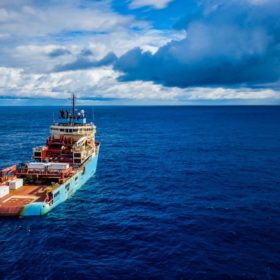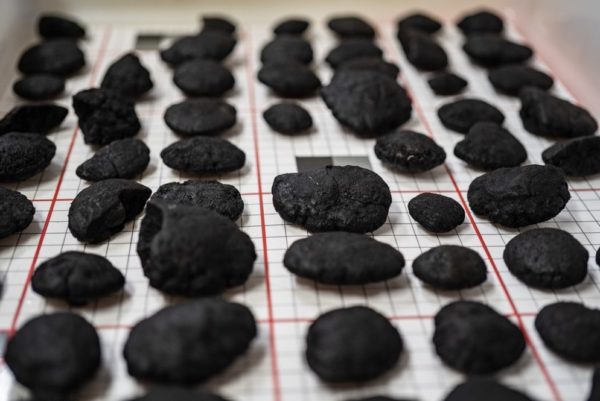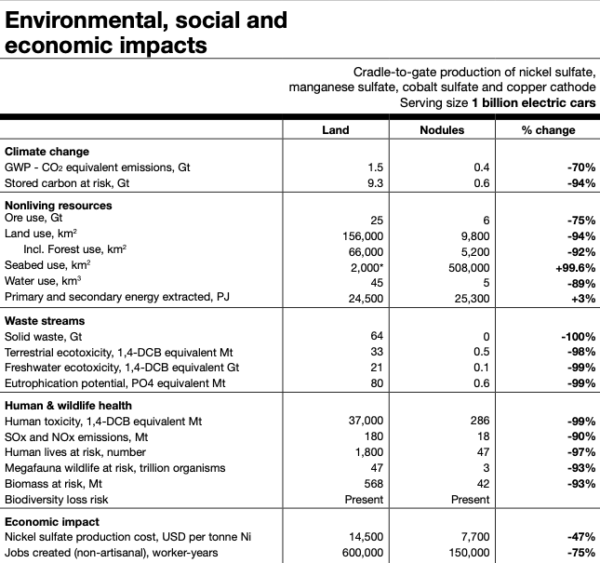
The International Seabed Authority will loosen regulations for deep-sea mining this year. The ocean floor is covered with potato-sized pebbles containing high levels of cobalt, manganese, nickel and copper – materials that could soon be in short supply as the energy transition progresses.
Though many agree that electric vehicles offer a substantial improvement over vehicles based on internal combustion engines, criticism about EVs persists – especially related to raw material sourcing practices. But a team of researchers from Canada, under the direction of DeepGreen Metals Inc., claim to have validated a more environmentally friendly way to source such materials. Ocean nodules – potato-sized lumps covering the ocean floor – have been mooted as a viable alternative to land-based ore mining. These rocks consist of nickel, cobalt, manganese, and copper.
“Ocean nodules are a unique resource to consider at a time when society urgently needs a good solution for supplying new virgin metals for the green transition,” DeepGreen Chairman and CEO Gerard Barron. “Extraction of virgin metals – from any source – is, by definition, not sustainable and generates environmental damage. It’s our responsibility to understand the benefits – as well as the damages associated with sourcing base metals from nodules.”

Image: DeepGreen Metals Inc.
DeepGreen Metals, a company that specializes in polymetallic nodule exploration, has worked for over a year to examine the impact of extracting battery materials from subsea rocks. With EV and storage rollout still in its nascent stages, the clean-tech industry’s thirst for copper, nickel, manganese, and cobalt will only grow in the years to come. Already, the effects of land-based mining activities can be seen, as the land-use leads to environmental destruction.
Sustainability analysis
The team under DeepGreen performed lifecycle sustainability analysis (LCSA) and standard lifecycle analysis to compare the impact of producing batteries from polymetallic nodules from the floor of the Pacific Ocean and land-based ores. Their work is a first-of-its-kind LCSA study of the two sources for the production of 1 billion EV batteries. Several categories have been considered in the assessment, including greenhouse gas emissions, carbon sequestration, ecosystem services, non-living resources, biodiversity, human health, and economics.
Polymetallic nodules reportedly contain nearly entirely usable minerals and no toxic levels of deleterious elements. Another improvement over land ores is the high element concentration, which leaves zero solid waste when processing the nodules into battery cathodes. Land ores often contain less than 1% of the desired element, while generating tremendous amounts of solid wastes and toxic tailings.
By contrast, the researchers ascertain, nodule collection and processing could lead to a 70% reduction of carbon dioxide equivalent emissions, along with a 94% reduction in stored carbon at risk and a 90% reduction in SOx and NOx emissions. DeepGreen even claims a 100% reduction in solid waste, 94% less land use, and 92% less forest use.

“Over the last five years, there has been heightened awareness of the environmental, social, and economic impacts of producing metals from land ores,” said lead researcher Steven Katona. “We essentially built on existing lifecycle assessment indicators work for land-based mining and created an apples-to-apples comparison for battery material production from ocean nodules.”
Biodiversity concerns
Concerns about impacts on wildlife persist, however. The company concedes that it is assumed that the deep-sea floor provides only scarce food resources to support only limited biomass, but more research needs to be done. In this context, DeepGreen says it will perform a multi-year environmental and social impact assessment. It will be the most extensive integrated seabed-to-surface deep-ocean science program. More than 100 separate studies will be carried out in this vein, with partnerships with the Republic of Nauru, the Republic of Kiribati, and the Kingdom of Tonga already in place.
The idea of harvesting ocean nodules is not new. The Clarion-Clipperton Zone, a region in the Pacific Ocean known for hosting trillions of nodules, has been studied since the 1970s to determine the possibilities of harvesting minerals from the seafloor. Today, DeepGreen holds exclusive rights to explore this region, under the International Seabed Authority, the company said.
A July 2019 article in Nature discussed the possibilities of wildlife degradation due to the harvesting of ocean nodules. Some 30 years ago, Hjalmar Thiel devised the most substantial test to this day in the area. Thiel studied the region’ss meiofauna – tiny creatures living around the nodules – and assumed that harvesting could bury the animals under a layer of mud, leaving them to die. To prove his assumption, Thiel used an eight-meter wide rake in an 11 -square-kilometer section of seafloor. The rake caused a cloud of sediment to descend onto the meiofauna. The test revealed that the deposit did bury and suffocate the tiny creatures beyond a scale that was previously anticipated. The site has been revisited four times in the last 30 years, but very little life has returned there, according to Thiel.
Trajectory
DeepGreen and other companies are positioning themselves to use this resource, as marine mining legislation is set to change in favor of nodule-harvesting this year. In October, the company extracted its first metal from polymetallic nodules, and in March of this year, its partner company, Allseas, acquired a collecting vessel. And just a few weeks ago, DeepGreen disclosed the acquisition of Tonga Offshore Mining Ltd. (TOML), which grants the company access to a third seabed contract area in which to explore.
“As part of its commitment to develop these resources, which are defined as the ‘common heritage’ of humankind, DeepGreen is committed to full transparency, has pledged to share all knowledge generated and is currently involved in a global stakeholder engagement process,” according to the company.
Lắp đặt điện mặt trời Khải Minh Tech
https://ift.tt/2X7bF6x
0906633505
info.khaiminhtech@gmail.com
80/39 Trần Quang Diệu, Phường 14, Quận 3
Lắp đặt điện mặt trời Khải Minh Tech
https://ift.tt/2ZH4TRU
Không có nhận xét nào:
Đăng nhận xét